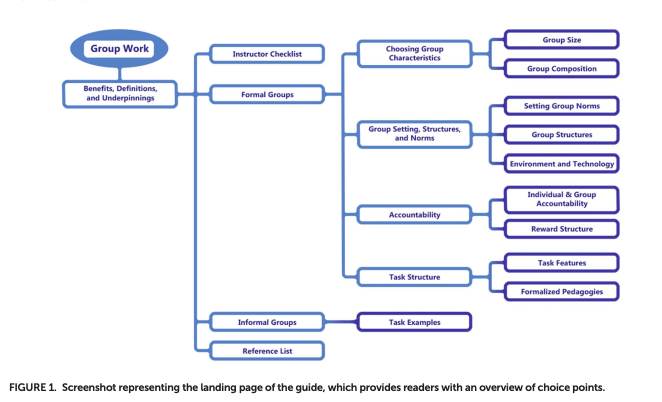Supplemental Resources: Supporting Student Learning
Facilitating Group Work
Page Navigation: Evidence-Based Best Practices | Resources for Facilitating Group Work
Evidence-Based Best Practices
Key Points & Principles
- The article “Ten Research-Based Steps for Effective Group Work” (Idea Paper #65) distills some of the foundations of group work into a pithy, evidence-rich but practical overview.
- The Vanderbilt Center for Teaching resource Group work: Using cooperative learning groups effectively provides basic principles for productive facilitation of group work, outlines a few classic forms of group work, and provides video examples of those practices in action.
Implementation Guide
- For a deeper dive into facilitating group learning, see the book Collaborative Learning Techniques: a Handbook for College Faculty by Barkley, Major, and Cross. This entire book is available online through the UW-Madison libraries. The opening segments include research-informed overviews of different forms of group work and best practices for structuring effective groups. The latter sections of the text include a series of structured group activities that instructors can adapt for their in-person or online courses.
The Evidence Base
- A great resource for instructors who want to delve into the evidence base around group work is the CBE Life Sciences Education summary of the literature on group work and interactive annotated bibliography on group work (illustrated below). This resource is especially helpful if you know the basic literature on how and why group work can be effective but have a specific question about the practical elements of this process—for instance, “how many people should I group together for this activity?” or “should I assign long-term or short-term groups?”

Resources for Facilitating Group Work
Note: In the documents below, asterisks (*) indicate that a document auto-downloads when clicked.
- In MTLE, we use this Constructive and Destructive Group Behaviors Handout* to facilitate conversations about communication styles as well as opportunities for support and growth.
- The Eberly Center provides a brief overview of the challenges of group work (opens in new tab) and ways instructors can address them, discusses different approaches to assessing group work (opens in new tab) (including peer assessment), and provides a range of handouts (opens in new tab) that instructors can adapt to help students work effectively in groups. Tools that have been of special interest to MTLE Fellows in the past
- Team Roles Handout*
- Sample Self-Evaluation Form for Group Work*
- Sample Group Process Assessment* – Note that this is a tool that works best if you have students complete the assessment part-way through a series of group interactions rather than after all of their work is complete. The goal is to give them the language and tools to troubleshoot differences of approach while they can still improve their group interactions rather than when it’s too late to change.

